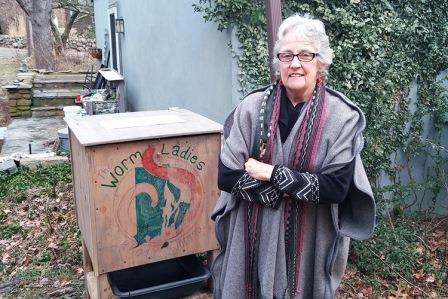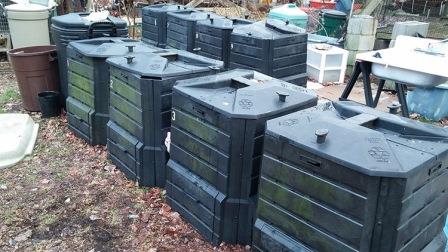February 10, 2015
Today’s Guest Blog is by KEVIN PROFT. It was first posted in ecoRI News on January 29, 2015.
CHARLESTOWN, R.I. — When Nancy Warner began raising worms in 1992, they were a means to an end. Tired of the flies attracted to the manure under the cages of her angora rabbits, whose fur she sheers, spins and knits, Warner began raising worms to eat the manure. The strategy solved her fly problem.
Now, more than two decades later, she still has the rabbits — 18 she thinks — but has little time to spin the fur; she’s too busy caring for tens of thousands of worms and running the small business The Worm Ladies of Charlestown.
Before she became a Worm Lady, Warner lived in Maryland. An artist by education, she has taught in continuing education and nursery school classrooms. She founded two art-focused initiatives, the Maryland Fiber Arts Center in 1984, a business that served as a one-stop shop for all things fiber, from weaving to paper-making, and the Maryland Cultural Arts Center in 1987, a nonprofit that sold same-day discounted tickets to local theater performances.
Warner moved to Rhode Island 15 years ago and continued raising rabbits and worms. Shortly after her arrival, Warner was reunited with a long-lost childhood friend, Lois Fulton, from the Bronx, N.Y., neighborhood where she grew up; until both moved to Charlestown, they hadn’t seen each other for 50 years. Together, they became The Worm Ladies.
Warner and Fulton raised and sold red wigglers — the worm of choice for composting — their castings, and a variety of related supplies and books. Customers placed orders from all over New England, and Warner has sent worms as far as Alaska; they can survive up to a week in the mail.
The Worm Ladies traveled southern New England, tabling at garden shows and presenting at trade conferences, to garden clubs and in classrooms to raise awareness about the benefits of composting with worms.
Worm composting, also known as vermicomposting, is a quick, efficient way to transform food scrap into a natural fertilizer. Usually, red wigglers are kept in a plastic bin or wooden box, and fed a combination of food scrap and bedding, such as shredded newspaper, cardboard and leaves. The resulting worm poop, called castings, is the finished product and acts as an excellent soil enhancer or plant food. A single tablespoon of worm castings is enough to feed a houseplant in a 10-inch pot for two months.
Red wigglers can eat up to half their body weight in food scrap weekly, and can divert as much as 35 percent of food scrap created in the home from the waste stream. Red wigglers can be fed vegetable and fruit scrap, coffee grounds, tea bags, crunched egg shells and manure. They reproduce quickly under proper conditions, doubling in population every three to four months.
A properly maintained worm bin has no unpleasant odor, so can be kept indoors in a laundry room, in the basement or under a kitchen sink.
Fulton has since moved on, and another Worm Lady, Susie Fehrman, has also come and gone. Warner runs the business mostly by herself now, but that isn’t slowing her down.
Worm hole
Warner’s home on East Beach Road has been taken over by worms. Stacks of worm bins and buckets of castings fill her seasonal rental apartment. The yard has more than a dozen compost bins filled with rabbit poop, food scrap, cardboard and angora fur — a red wiggler’s paradise. A big, spinning contraption, 8 feet long and 3 feet in diameter, designed to separate worms from castings sits next to the shed.
In addition to her worms and rabbits, Warner also keeps chickens and practices square-foot gardening. “I’m always getting into something new,” said the grandmother of four.
Her family supports her worm obsession. She has four grown children, one each in Seattle, Baltimore, Massachusetts and Rhode Island. When they visit, they share the summer rental with the worms.
“My husband was recently asked what he thought heaven was like,” Warner said. “He replied, ‘I just hope there are no worms.’”
Warner said children get especially excited about worm composting. She shared a story about a parent coaxing her daughter to spend more time potty training by keeping a small worm bin in a bathroom drawer. To capitalize on this eager and impressionable audience, Warner recently authored a children’s book titled “What is a Red Wiggler?” It will soon be available in standard and digital formats.
“There are a lot of children’s books about worms, but not many books on composting worms,” she said.
Warner said business picked up shortly after the Providence Journal ran a feature on The Worm Ladies in March 2003 — the article resulted in a three-month backlog of orders. Demand for worms and their castings remains high.
“People want truckloads of castings,” Warner said. “They want more than I have.”
To meet this demand, Warner is planning on expanding. In the 1980s, she walked away from the Fiber Arts Center because she didn’t have the means to grow the company.
“I learned you get bigger or quit,” she said. This time around she would like to experiment with getting bigger.
Worm education
Warner hopes to start selling worms and supplies to people interested in mid-sized vermicompost systems. Currently, her customers are mostly individuals who compost their kitchen scraps. She said schools such as the Rhode Island School of Design (RISD) and the Henry Barnard Elementary School on the campus of Rhode Island College in Providence have both expressed interest, to help divert cafeteria waste from their Dumpsters.
The Greene School, an environmentally focused charter school of about 170 students in West Greenwich, R.I., is developing a collection of vermicompost best-practices. The Greene School has been composting its lunch scraps since its establishment in 2010, according to Alex Edelmann, a history teacher at the school.
While small in scale — the school only composts about 1-2 pounds week, though there’s hope to increase capacity significantly — the staff has integrated composting into the school curriculum and culture. Last year, it became the official 10th-grade stewardship project, and is incorporated into the school’s chemistry classes.
In addition to one large worm bin, each classroom and lunch room has a small “demonstration bin” for students to dispose of scraps. Students experiment with different methods in each bin and troubleshoot problems such as too much or too little moisture, according to Edelmann.
One of the program’s goals is to make compost tea from worm castings to fertilize the school’s garden. Another is to raise enough worms to allow students to bring some home to establish their own bins, Edelmann said.
While The Greene School has experienced success, a school such as RISD would need to create a much larger system — one with enough worms to eat 65 pounds of food scrap daily, according to Warner.
With new compost regulations coming online in Rhode Island in 2016 that will require large institutions to divert food scrap from the state’s waste stream, Warner expects there to be growing interest in composting solutions such vermicompost.
Warner would also like to be able to meet demand for customers who want bulk quantities of castings, such as nurseries.
Warner currently doesn’t have the capacity to provide customers interested in mid-sized vermicompost systems or bulk castings. To help grow her supply she has begun offering to buy back excess worms and castings from her customers.
Warners long-term strategy to meet demand is to create The Co-op of Rhody Worm Growers. This co-op would be comprised of a group of established vermicomposters from around the state who would pool their resources to better meet demand. The co-op would provide the necessary amount of worms to handle mid-scale vermicomposting in cafeterias, as well as individual and wholesale worm sales, she said.
Warner said people don’t compost with worms because it’s not on their radar.
“People are not aware of worm composting. It frustrates us who know the potential, which is why we just want to go out and spread the word,” she said. “You reduce waste and get a product that can replace chemical fertilizers, which are bad for the soil and for our water.”
Another hurdle, according to Warner, is a lack of perseverance by those willing to give vermicomposting a try. Warner said each person’s experience raising worms is a little different, and it often takes experimentation and, sometimes, a couple of tries to figure it out.
Warner said she is regularly surprised by the different ways people successfully raise worms. “I would never think (some of their methods) could work, but, for everything, there is an exception to the rule,” she said.
KEVIN PROFT is an ecoRI news staff writer. ecoRI Inc. is a nonprofit devoted to educating the public about local environmental and social justice issues and how they interconnect.
NERC welcomes Guest Blog submissions. To inquire about submitting articles contact Athena Lee Bradley, Projects Manager. Disclaimer: Guest blogs represent the opinion of the writers and may not reflect the policy or position of the Northeast Recycling Council, Inc.




Comments (0)
Add a Comment